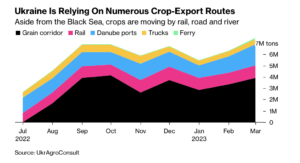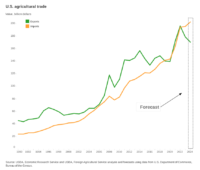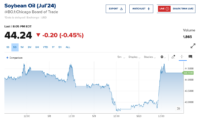Bloomberg's Clarice Couto reported this past Friday that "a surprising tax change in agriculture powerhouse Brazil has the potential to make soy grown in the world’s largest bean exporter less…
As “Rankled Farmers” in Europe Deal with Ukraine’s Trapped Grain, Transit of Ukrainian Farm Exports Through Poland Resumes
Reuters writers Alan Charlish and Marek Strzelecki reported today that, “The first trucks carrying Ukrainian food products including corn and eggs were bound to start transit via Poland to the Netherlands on Friday morning, a Polish customs official said, as rules allowing the shipments took effect overnight.
“The rules brought an end to a ban that was introduced without notice on April 15 leaving many companies with goods stranded across the border in Ukraine.”
The Reuters article explained that, “Several central European countries affected by a glut of Ukrainian agricultural imports that have suppressed prices for local producers have introduced bans on imports from Ukraine this week.
“Poland, the first country to act, went further by also banning the transit of such goods.
“However, on Tuesday an agreement was reached with Ukraine to allow transit to resume using sealed containers that will travel in convoys.”

And Reuters writers Boldizsar Gyori and Krisztina reported yesterday that, “Hungary called on Thursday for ‘progressive’ aid from the EU to help move Ukraine’s grain through central European countries whose farmers are having to compete with its cheaper imports.”
The article added that, “[Agriculture Minister Istvan Nagy] had said on Wednesday that Budapest will continue to allow the transit of Ukrainian grain through Hungary, ensuring the departure of shipments ‘in a controlled manner.'”
Elsewhere, Reuters writers Gergely Szakacs and Boldizsar Gyori reported today that, “The Hungarian Grain and Feed Association said on Friday it opposed the government’s ban on grain and oilseed imports from neighbouring Ukraine, adding that the restrictions will hit feed makers and industrial users in Hungary.”
The article pointed out that, “The Central European country was not the first one to impose restrictions on Ukraine’s food products, with Poland being first and Slovakia and Bulgaria quickly following suit.”
Also today, Reuters writer Luiza Ilie reported that, “Romania will not unilaterally ban the import of Ukrainian grain and will wait for the European Commission to enforce measures to help central and eastern European farmers, Agriculture Minister Petre Daea said on Friday.”
“Romania is the only one of five central and eastern European states that has stopped short of banning imports of Ukrainian grains, while tightening controls at border checkpoints,” the article said.

More broadly, New York Times writer Patricia Cohen reported in today’s paper that, “In Britain, food prices were up 19 percent last month from the previous year. In Spain, farmers are worried that a lack of rainfall will irreversibly damage wheat and barley production. And in West and Central Africa, record numbers of people are facing potentially dire food shortages.
Nonetheless, a handful of European nations including Poland and Hungary have blocked the entry of farm products from Ukraine — one of the world’s biggest grain exporters — arguing that the flood of cheap imports is ruining local farmers. Now, to quell the rising discord, the European Union is considering a temporary ban on grain imports to five nations.
“The combination of spiraling prices for consumers in one part of the world and plummeting incomes for farmers in another illustrates the maddening complexities of the global food market.”
The Times article explained that, “With sea shipments from Ukrainian ports blocked or restricted by Russian forces, the European Union suspended tariffs and quotas on food from Ukraine and rushed to transport as much as possible by rail and truck through neighboring countries. The idea was to create an alternate pathway that would funnel grain from Ukraine’s breadbasket to the Middle East, Africa and parts of Asia, where it was most needed.
“The plan worked, at least to some degree, easing anxieties over shortages. Food prices have dropped by more than 20 percent from a peak in March 2022, according to a food price index calculated by the United Nations Food and Agriculture Organization.
“Much of the Ukrainian grain was getting to far-off markets by traveling through Poland, Romania, Slovakia and Hungary, as well as Bulgaria — but not all of it. And that is what has set off the tensions.”
Today’s article added that, “The prohibitions on Ukrainian grain to neighboring countries come at the same time that Russia is threatening to back out of a deal brokered by the United Nations and Turkey to allow grain shipments to leave Ukraine’s Black Sea ports. That deal is set to expire on May 18, although talks about an extension are continuing.”
Meanwhile, Reuters writer Pavel Polityuk reported today that, “Ukrainian farms had sown the first million hectares of spring grains by April 21, agriculture ministry data showed on Friday.”







